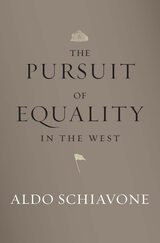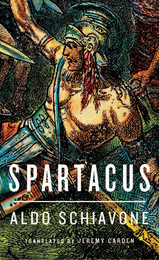
The papers in this volume are based on a 2006 Princeton University symposium in honor of Glen W. Bowersock on the occasion of his retirement from the faculty of the Institute for Advanced Study. Here a distinguished international group of ancient historians explores the classical antiquity that Bowersock has given us over a scholarly career of almost fifty years.
The topics offered in East and West range throughout the ancient world from the second century BCE to late antiquity, from Hellenistic Greece and Republican Rome to Egypt and Arabia, from the Second Sophistic to Roman imperial discourse, from Sulla’s self-presentation in his memoirs to charitable giving among the Manichaeans in Egypt.
This collection of essays represents the first attempt to take in Glen Bowersock’s well-developed scholarly interests as a whole. The contributors open up new avenues that often run well beyond the conventional geographical and temporal boundaries of the Greco-Roman Mediterranean, leading to a host of fresh insights into antique thought and life.


Law is a specific form of social regulation distinct from religion, ethics, and even politics, and endowed with a strong and autonomous rationality. Its invention, a crucial aspect of Western history, took place in ancient Rome. Aldo Schiavone, a world-renowned classicist, reconstructs this development with clear-eyed passion, following its course over the centuries, setting out from the earliest origins and moving up to the threshold of Late Antiquity.
The invention of Western law occurred against the backdrop of the Roman Empire's gradual consolidation—an age of unprecedented accumulation of power which transformed an archaic predisposition to ritual into an unrivaled technology for the control of human dealings. Schiavone offers us a closely reasoned interpretation that returns us to the primal origins of Western legal machinery and the discourse that was constructed around it—formalism, the pretense of neutrality, the relationship with political power. This is a landmark work of scholarship whose influence will be felt by classicists, historians, and legal scholars for decades.

One of the world’s foremost historians of Western political and legal thought proposes a bold new model for thinking about equality at a time when its absence threatens democracies everywhere.
How much equality does democracy need to survive? Political thinkers have wrestled with that question for millennia. Aristotle argued that some are born to command and others to obey. Antiphon believed that men, at least, were born equal. Later the Romans upended the debate by asking whether citizens were equals not in ruling but in standing before the law. Aldo Schiavone guides us through these and other historical thickets, from the first democracy to the present day, seeking solutions to the enduring tension between democracy and inequality.
Turning from Antiquity to the modern world, Schiavone shows how the American and the French revolutions attempted to settle old debates, introducing a new way of thinking about equality. Both the French revolutionaries and the American colonists sought democracy and equality together, but the European tradition (British Labour, Russian and Eastern European Marxists, and Northern European social democrats) saw formal equality—equality before the law—as a means of obtaining economic equality. The American model, in contrast, adopted formal equality while setting aside the goal of economic equality.
The Pursuit of Equality in the West argues that the United States and European models were compatible with industrial-age democracy, but neither suffices in the face of today’s technological revolution. Opposing both atomization and the obsolete myths of the collective, Schiavone thinks equality anew, proposing a model founded on neither individualism nor the erasure of the individual but rather on the universality of the impersonal human, which coexists with the sea of differences that makes each of us unique.

Spartacus (109?–71 BCE), the slave who rebelled against Rome, has been a source of endless fascination: the subject of myth-making in his own time, and of movie-making in ours. Hard facts about the man have always yielded to romanticized tales and mystifications. In this riveting, compact account, Aldo Schiavone rescues Spartacus from the murky regions of legend and brings him squarely into the arena of serious history.
Schiavone transports us to Italy in the first century BCE, where the pervasive institution of slavery dominates all aspects of Roman life. In this historic landscape, carefully reconstructed by the author, we encounter Spartacus, who is enslaved after deserting from the Roman army to avoid fighting against his native Thrace. Imprisoned in Capua and trained as a gladiator, he leads an uprising that will shake the empire to its foundations.
While the grandeur of the Spartacus story has always been apparent, its political significance has been less clear. What were his ambitions? Often depicted as the leader of a class rebellion that was fierce in intent but ragtag in makeup and organization, Spartacus emerges here in a very different light: the commander of an army whose aim was to incite Italy to revolt against Rome and to strike at the very heart of the imperial system. Surprising, persuasive, and highly original, Spartacus challenges the lore and illuminates the reality of a figure whose achievements, and whose ultimate defeat, are more extraordinary and moving than the fictions we make from them.
READERS
Browse our collection.
PUBLISHERS
See BiblioVault's publisher services.
STUDENT SERVICES
Files for college accessibility offices.
UChicago Accessibility Resources
home | accessibility | search | about | contact us
BiblioVault ® 2001 - 2024
The University of Chicago Press









